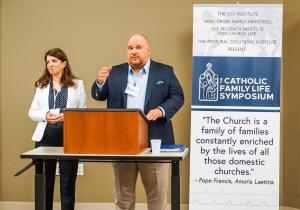
*This post is one among a series of articles discussing the liturgy of domestic church life. For more information, join the conversation on facebook in our group Catholic HOM—Family Discipleship.
Due to the COVID-19 pandemic, it seems every day brings new changes, adjustments to the “plan,” and a “new normal” to adapt to. One of the many things that have changed is our ability to go to church. Many of us have not been to church in months, maybe we attend online, maybe we’re able to attend a service outdoors, or maybe we’re able to go to church in a way that meets the limited capacity requirements. But with all of these changes, how has our faith life been impacted?
A recent study by PEW Research found that most people’s faith has remained unchanged (47%) or grown stronger (24%) despite not being able to go to church during the pandemic. Only 2% report struggling in their faith because of events related to the pandemic.
__________________________________________________________________________
Discovering God Together: The Catholic Guide to Raising Faithful Kids
__________________________________________________________________________
How can this be?
For a lot of us, the changes in our ability to attend our regular church service has caused us to be a lot more intentional and prioritize our faith in a different way. As research shows, some have had great success in developing their faith life in new ways, but for others this has been more of a struggle.
Many of us are still searching for new ways to live our faith at home and grow in faith as a family. The changes caused by COVID-19 have clear implications for our domestic church life. The Liturgy of Domestic Church Life is a way for Catholic families to make faith the source of the warmth in our homes. Below are a few ways we can do just that:
1. Make prayer time cozy, not uncomfortable—Many of us feel that for our family prayer time at home we must all be kneeling and perfectly still. If this is comfortable for you as a family, great! But often this sort of expectation makes prayer time (especially with younger children) a bit of a battle. Make prayer time cozy and inviting. Set soft lighting, play relaxing music or praise and worship songs softly in the background, surround yourselves with blankets and pillows and cuddle up together as a family. Make your prayer space and prayer time feel like a warm hug in the arms of God—the one who knows us best and loves us most. This is a great way to developing a loving relationship with God for our kids and for ourselves!
2. See God in your day-to-day—Make a point of noticing God in little ways throughout the day. Find a great parking spot, say, “Thanks God!” Out loud. Catch a beautiful sunrise or sunset? Acknowledge how God painted the sky today. Had a good conversation or meeting? Thank God for letting it go so well. By acknowledging how we see God working in our day-to-day lives allows us to prioritize God in a beautiful way. Check in with the family at the end of each day, maybe even over dinner, and ask, “How/where did you see God in your day?” Discuss those little (and big!) blessings.
3. Keep traditions alive—Let’s face it, we all love coffee and donut Sunday. It’s a fun way to get a special treat, have some nice conversation, and make our faith life a bit more fun. Keep traditions such as this alive at home! After watching Mass online, share coffee/juice and donuts/muffins (or whatever your favorite family treats are) together—even for a few minutes. This would be a fun way to get a few minutes together as a family, enjoying each other’s company (and maybe sharing our mass take-aways) before going about the rest of our day.
For more ways to live out your faith as a family, check out Discovering God Together: The Catholic Guide to Raising Faithful Kids. And join our discussion on facebook at Catholic HOM—Family Discipleship!









